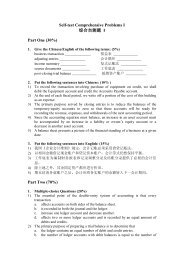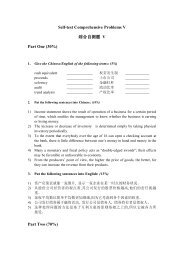Vodafone Group Plc Annual Report for the year ended 31 March 2012
Vodafone Group Plc Annual Report for the year ended 31 March 2012
Vodafone Group Plc Annual Report for the year ended 31 March 2012
Create successful ePaper yourself
Turn your PDF publications into a flip-book with our unique Google optimized e-Paper software.
<strong>Vodafone</strong> <strong>Group</strong> <strong>Plc</strong><br />
<strong>Annual</strong> <strong>Report</strong> <strong>2012</strong> 156<br />
Shareholder in<strong>for</strong>mation (continued)<br />
Additional tax considerations<br />
UK inheritance tax<br />
An individual who is domiciled in <strong>the</strong> United States (<strong>for</strong> <strong>the</strong> purposes of<br />
<strong>the</strong> Estate Tax Convention) and is not a UK national will not be subject to<br />
UK inheritance tax in respect of our shares or ADSs on <strong>the</strong> individual’s<br />
death or on a transfer of <strong>the</strong> shares or ADSs during <strong>the</strong> individual’s<br />
lifetime, provided that any applicable US federal gift or estate tax is paid,<br />
unless <strong>the</strong> shares or ADSs are part of <strong>the</strong> business property of a UK<br />
permanent establishment or pertain to a UK fixed base used <strong>for</strong> <strong>the</strong><br />
per<strong>for</strong>mance of independent personal services. Where <strong>the</strong> shares or<br />
ADSs have been placed in trust by a settlor <strong>the</strong>y may be subject to<br />
UK inheritance tax unless, when <strong>the</strong> trust was created, <strong>the</strong> settlor was<br />
domiciled in <strong>the</strong> United States and was not a UK national. Where <strong>the</strong><br />
shares or ADSs are subject to both UK inheritance tax and to US federal<br />
gift or estate tax, <strong>the</strong> estate tax convention generally provides a credit<br />
against US federal tax liabilities <strong>for</strong> UK inheritance tax paid.<br />
UK stamp duty and stamp duty reserve tax<br />
Stamp duty will, subject to certain exceptions, be payable on any<br />
instrument transferring our shares to <strong>the</strong> custodian of <strong>the</strong> depositary<br />
at <strong>the</strong> rate of 1.5% on <strong>the</strong> amount or value of <strong>the</strong> consideration if on<br />
sale or on <strong>the</strong> value of such shares if not on sale. Stamp duty reserve tax<br />
(‘SDRT’), at <strong>the</strong> rate of 1.5% of <strong>the</strong> price or value of <strong>the</strong> shares, could also<br />
be payable in <strong>the</strong>se circumstances and on issue to such a person but no<br />
SDRT will be payable if stamp duty equal to such SDRT liability is paid.<br />
A ruling by <strong>the</strong> European Court of Justice has determined that <strong>the</strong> 1.5%<br />
SDRT charges on issue of shares to a clearance service is contrary to EU<br />
law. As a result of that ruling, HMRC indicated that where new shares are<br />
first issued to a clearance service or to a depositary within <strong>the</strong> European<br />
Union, <strong>the</strong> 1.5% SDRT charge will not be levied. Subsequently, a recent<br />
decision by <strong>the</strong> first-tier tax tribunal in <strong>the</strong> UK ext<strong>ended</strong> this ruling to <strong>the</strong><br />
issue of shares (or, where it is integral to <strong>the</strong> raising of new capital, <strong>the</strong><br />
transfer of shares) to depositary receipts systems wherever located.<br />
HMRC have stated that <strong>the</strong>y will not seek to appeal this decision and,<br />
as such, will no longer seek to impose 1.5% SDRT on <strong>the</strong> issue of shares<br />
(or, where it is integral to <strong>the</strong> raising of new capital, <strong>the</strong> transfer of shares)<br />
to a clearance service or to a depositary, wherever located. Investors<br />
should, however, be aware that this area may be subject to fur<strong>the</strong>r<br />
developments in <strong>the</strong> future.<br />
No stamp duty will be payable on any transfer of our ADSs provided<br />
that <strong>the</strong> ADSs and any separate instrument of transfer are executed<br />
and retained at all times outside <strong>the</strong> United Kingdom. A transfer of our<br />
shares in registered <strong>for</strong>m will attract ad valorem stamp duty generally at<br />
<strong>the</strong> rate of 0.5% of <strong>the</strong> purchase price of <strong>the</strong> shares. There is no charge to<br />
ad valorem stamp duty on gifts.<br />
SDRT is generally payable on an unconditional agreement to transfer<br />
our shares in registered <strong>for</strong>m at 0.5% of <strong>the</strong> amount or value of <strong>the</strong><br />
consideration <strong>for</strong> <strong>the</strong> transfer, but is repayable if, within six <strong>year</strong>s of <strong>the</strong><br />
date of <strong>the</strong> agreement, an instrument transferring <strong>the</strong> shares is executed<br />
or, if <strong>the</strong> SDRT has not been paid, <strong>the</strong> liability to pay <strong>the</strong> tax (but not<br />
necessarily interest and penalties) would be cancelled. However, an<br />
agreement to transfer our ADSs will not give rise to SDRT.<br />
PFIC rules<br />
We do not believe that our shares or ADSs will be treated as stock of<br />
a passive <strong>for</strong>eign investment company (‘PFIC’) <strong>for</strong> US federal income<br />
tax purposes. This conclusion is a factual determination that is made<br />
annually and thus is subject to change. If we are treated as a PFIC, any<br />
gain realised on <strong>the</strong> sale or o<strong>the</strong>r disposition of <strong>the</strong> shares or ADSs would<br />
in general not be treated as capital gain unless a US holder elects to<br />
be taxed annually on a mark-to-market basis with respect to <strong>the</strong> shares<br />
or ADSs. O<strong>the</strong>rwise a US holder would be treated as if he or she has<br />
realised such gain and certain ‘excess distributions’ rateably over <strong>the</strong><br />
holding period <strong>for</strong> <strong>the</strong> shares or ADSs and would be taxed at <strong>the</strong> highest<br />
tax rate in effect <strong>for</strong> each such <strong>year</strong> to which <strong>the</strong> gain was allocated.<br />
An interest charge in respect of <strong>the</strong> tax attributable to each such <strong>year</strong><br />
would also apply. Dividends received from us would not be eligible <strong>for</strong><br />
<strong>the</strong> preferential tax rate applicable to qualified dividend income <strong>for</strong><br />
certain non-corporate holders.<br />
Backup withholding and in<strong>for</strong>mation reporting<br />
Payments of dividends and o<strong>the</strong>r proceeds to a US holder with respect<br />
to shares or ADSs, by a US paying agent or o<strong>the</strong>r US intermediary will be<br />
reported to <strong>the</strong> Internal Revenue Service (‘IRS’) and to <strong>the</strong> US holder as<br />
may be required under applicable regulations. Backup withholding may<br />
apply to <strong>the</strong>se payments if <strong>the</strong> US holder fails to provide an accurate<br />
taxpayer identification number or certification of exempt status or<br />
fails to report all interest and dividends required to be shown on its US<br />
federal income tax returns. Certain US holders are not subject to backup<br />
withholding. US holders should consult <strong>the</strong>ir tax advisers as to <strong>the</strong>ir<br />
qualification <strong>for</strong> exemption from backup withholding and <strong>the</strong> procedure<br />
<strong>for</strong> obtaining an exemption.<br />
Foreign financial asset reporting<br />
Recently enacted legislation imposes new reporting requirements on<br />
US holders with respect to <strong>the</strong> holding of certain <strong>for</strong>eign financial assets,<br />
including equity of <strong>for</strong>eign entities, if <strong>the</strong> aggregate value of all of <strong>the</strong>se<br />
assets exceeds US$50,000. The shares and ADSs are expected to<br />
constitute <strong>for</strong>eign financial assets subject to <strong>the</strong>se requirements unless<br />
<strong>the</strong> shares and ADSs are held in an account at a financial institution (in<br />
which case, <strong>the</strong> account may be reportable if maintained by a <strong>for</strong>eign<br />
financial institution). US holders should consult <strong>the</strong>ir tax advisors<br />
regarding <strong>the</strong> application of this legislation.<br />
.






